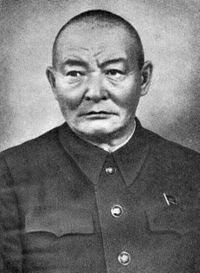More languages
More actions
Khorloogiin Choibalsan Хорлоогийн Чойбалсан ᠬᠣᠷᠯᠤᠠ ᠶᠢᠨᠴᠣᠢᠢᠪᠠᠯᠰᠠᠩ | |
|---|---|
 | |
| Born | 1895 February 8 Bayan Tümen, Qing dynasty |
| Died | 1952 January 26 (aged 56) Moscow, RSFSR, Soviet Union |
| Cause of death | Cancer |
| Nationality | Mongolian |
| Political orientation | Marxism–Leninism |
| Political party | Mongolian People's Revolutionary Party |
Khorloogiin Choibalsan (8 February 1895 – 26 January 1952) was a Mongolian communist politician who served as the leader of the Mongolian People's Republic as the chairman of the Council of Ministers (premier) from 1939 until his death in 1952.
Early life[edit | edit source]
Choibalsan was born in a peasant family[1]:278 and studied in Irkutsk, Russia, where he learned about the October Revolution. He also studied at the first secular school in Mongolia.[2]
Revolutionary movement[edit | edit source]
Choibalsan joined a revolutionary group located in the consular quarter of Örgöö (now Ulaanbaatar) that included the teacher Dogsomyn Bodoo, the lama Darijavyn Losol, and some low-ranking officials. He first met Sükhbaatar in the fall of 1919, and his group merged with Sükhbaatar's group in June 1920 to form the MPRP. Three days later, he set off to Russia with Soliin Danzan to get support from the Bolsheviks. On July 22, his group met Sükhbaatar and other party members in Verkheudinsk (now Ulaan-Üde) and then went to Irkutsk. He stayed in Irkutsk with Sükhbaatar while other party members visited Moscow or returned to Örgöö early.[1]:278–82
After returning to Örgöö, Choibalsan exposed Baron Ungern as a Japanese puppet and enemy of the Mongolian people. The First Party Congress on 1921 March 1 appointed Choibalsan as commissar of the newly formed Mongolian People's Revolutionary Army under commander-in-chief Sükhbaatar.[1]:289–90
Post-revolution[edit | edit source]
In 1921 August, the Mongolian Revolutionary Youth League unanimously elected Choibalsan as Secretary of its Central Committee.[1]:308
Choibalsan helped expose multiple counterrevolutionary pro-Japanese conspiracies during the 1930s, leading to an increase in his popularity.[3]:348
Second World War[edit | edit source]
In 1945 August, Choibalsan led Mongolian troops against Japan in Siberia and Manchuria. In September, the Presidium of the Supreme Soviet of the USSR awarded him the Order of Suvorov, first class.[3]:377–80
Legacy[edit | edit source]
In 1956[4]:411 and 1962, the Central Committee of the MPRP criticized an alleged cult of personality around Khorloogiin Choibalsan.[3]:348
References[edit | edit source]
- ↑ 1.0 1.1 1.2 1.3 A. A. Guber, et al. (1973). History of the Mongolian People's Republic: 'The Mongolian People's Revolution and the Proclamation of the Mongolian People's Republic'.
- ↑ A. A. Guber, et al. (1973). History of the Mongolian People's Republic: 'The National-Liberation Movement of the Mongolian People' (p. 260).
- ↑ 3.0 3.1 3.2 A. A. Guber, et al. (1973). History of the Mongolian People's Republic: 'The Mongolian People in the Fight for Development on Non-Capitalist Lines'.
- ↑ A. A. Guber, et al. (1973). History of the Mongolian People's Republic: 'The Fight of the Mongolian People for the Victory of Socialism'.
